Udemy is a global online learning platform offering thousands of courses on many subjects. It competes with other online education services by providing video lessons taught by industry experts and educators. This article gives a detailed overview of Udemy’s reviews, pricing, and features. Our goal is to help students and parents compare Udemy to other tutoring and course platforms.
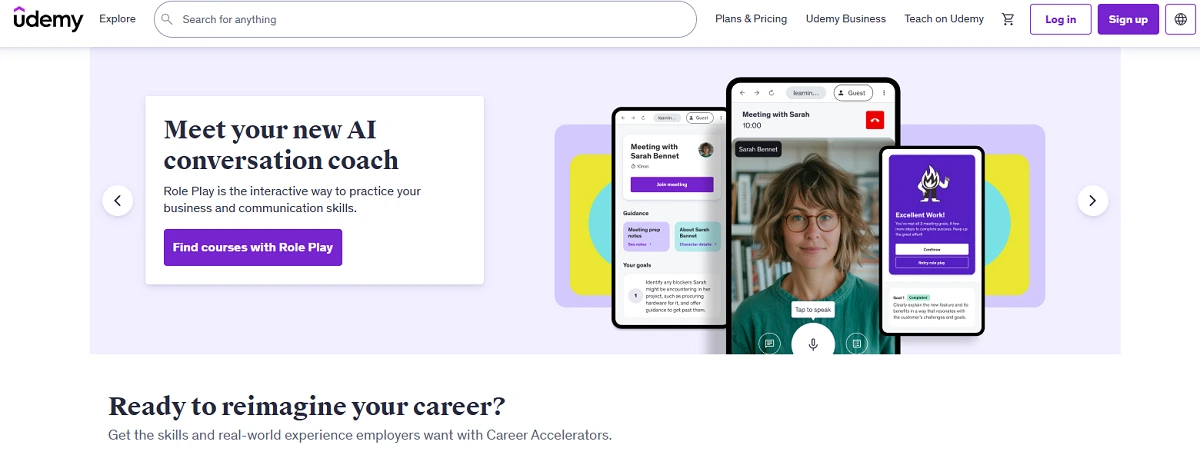
Udemy reviews can look contradictory depending on where you read them. This chart compares ratings across major platforms at a glance.
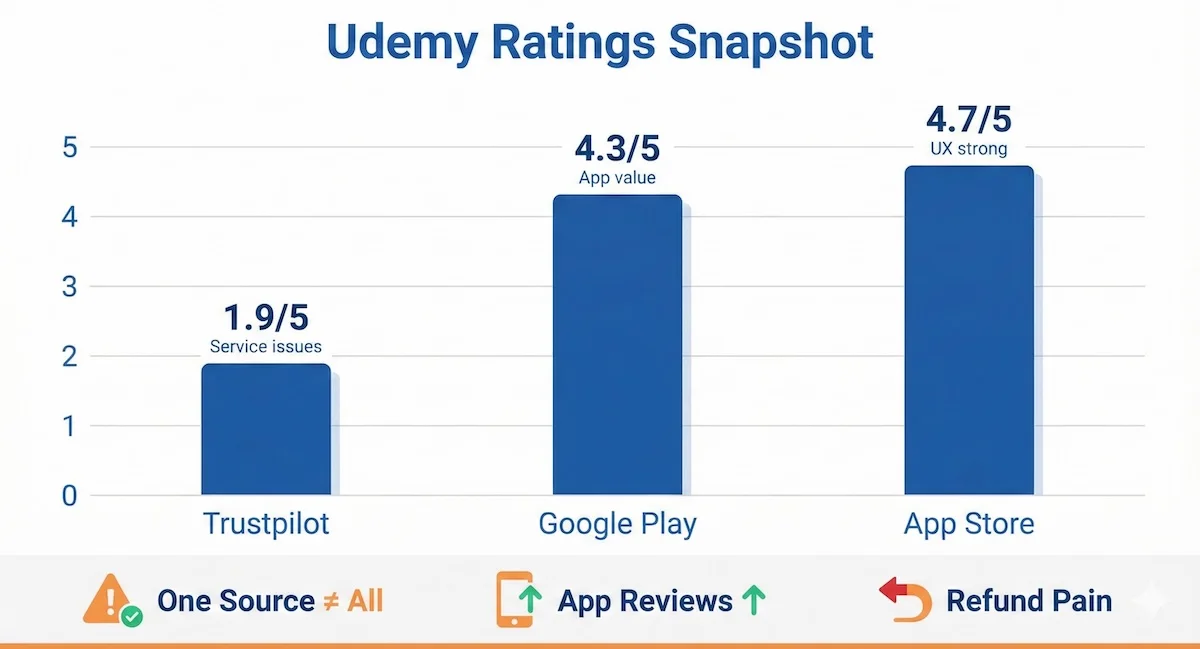
This chart compares Udemy reviews across platforms so students can interpret ratings more accurately.
Use platform context—service complaints vs app usability—before deciding whether Udemy fits your needs.
Udemy Reviews and Testimonials
Trustpilot
On Trustpilot, Udemy has 1,603 reviews with an average rating of 1.9 out of 5. Many students and parents report problems with billing or refunds. For example, some reviews say customers were charged incorrectly or could not get money back. A few positive reviews mention that content quality and instructor expertise are good when a course suits a student’s needs. Overall, the Trustpilot feedback is largely negative due to service issues.
Google Play Store
Udemy’s Android app has a 4.3/5 star rating from ~450,000 reviews. Users praise the large course catalog and offline viewing mode, which lets them learn without Internet. One reviewer says the app offers “skill-building classes for cheap.” Some complaints note occasional app crashes or glitches after updates, but most users find it stable. The Google Play reviews suggest the app is useful and the course content is valuable.
Apple App Store
On iOS, the Udemy app has 4.7/5 stars from 76.4K ratings. Learners often comment that the app is well-designed with good video quality and an easy interface. Many Apple users like the quick search and download features. A few mention bugs, such as download problems that Udemy later fixed. Overall, reviews on the App Store are very positive about the mobile experience.
Udemy Blog
Udemy’s official site and blog feature testimonials and positive mentions. For example, a Udemy news article quotes users saying anyone can “learn from the world’s experts” on Udemy, and that paid courses often cost far less than college classes. Another testimonial notes that Udemy makes it easy to offer or take courses, with lifetime access and a money-back guarantee. These company posts highlight Udemy’s strengths but are more promotional in nature.
Is Udemy legit? Yes, Udemy is a real, established education platform. It is used by millions of learners worldwide. However, the reviews above show mixed experiences. Many users find valuable courses at low sale prices, but some have issues with customer service and billing. In short, Udemy is genuine and popular, but prospective users should be aware of its customer service history.
Udemy Pricing
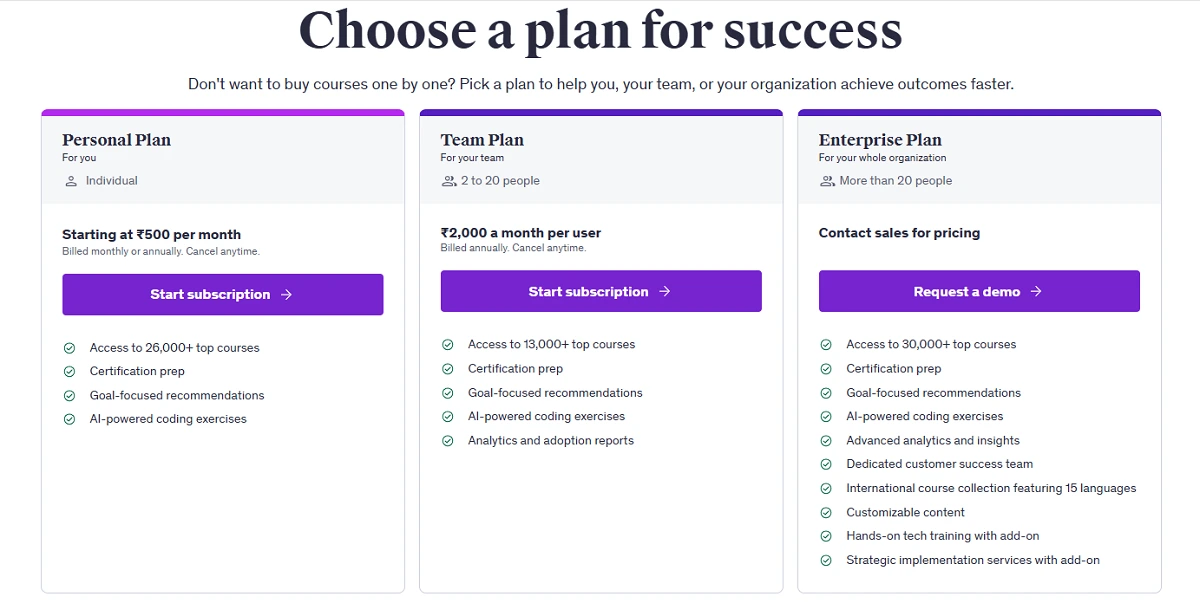
Pricing Range
Udemy’s course pricing varies widely. Individual courses often list prices up to $200 or more, but most are sold on sale for about $10–$20. For example, an intro coding course might show a $100 price tag, yet sell for $12 during a promotion. Udemy also sells subscription plans. The Personal Plan costs about $29.99 per month (monthly or annual billing) for access to a curated course library. Instructors set course prices within Udemy’s tiers, and Udemy keeps a commission. Typically, an instructor earns 37% of a sale (higher if they supply a coupon).
Udemy pricing is easiest to understand when you separate list price, sale price, and subscriptions. Here’s a one-screen comparison.
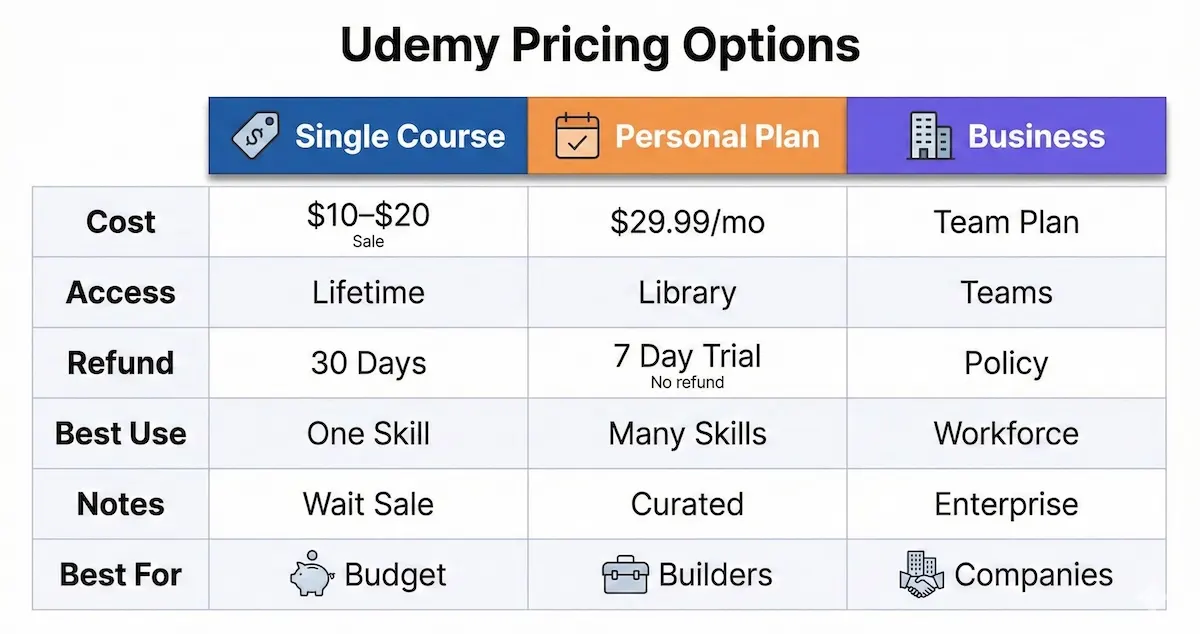
Use this Udemy pricing table to compare course purchases versus subscription options in seconds.
If you’re price-sensitive, the table makes it obvious when to wait for a sale versus try the subscription.
What students say about Udemy Pricing
Many users think Udemy is fairly priced when discounts are used. On forums like Reddit, students note that the vast majority of courses drop to ~$9.99–19.99 regularly. They say it’s best to wait for a sale. Compared to other platforms, paying $10–$20 for a course is a bargain, so students often feel the price is justified. However, people also mention that the full list prices can be misleadingly high, which causes confusion when the sale ends.
Hidden costs
Udemy has no hidden registration or cancellation fees for one-time course purchases. You just pay the listed price (plus any taxes) when you enroll. The courses come with lifetime access, so there are no ongoing charges. However, refunds are mainly processed as credits to your Udemy account. Also, if you sign up for a Udemy Personal subscription, there is no refund after the 7-day trial ends. Thus, the main “hidden” issue is that refunds may come as Udemy credit rather than a bank refund if you don’t choose carefully.
How Udemy’s pricing works
Udemy accepts all major payment methods, including credit/debit cards and PayPal. Mobile app purchases can use Apple or Google Pay. Payment is generally made up front when you enroll in a course. Udemy often provides discount coupons via email or instructors, which you can apply at checkout. There are no group discounts or special rates for categories like students; however, organizations can buy team licenses. The Personal and Business subscriptions are billed monthly or annually as described on Udemy’s pricing page.
Free Trial
Udemy offers a 7-day free trial for eligible users of its Personal Plan. If you see a “Try Personal Plan for free” option on a course, you can use it to access courses for a week without charge. There is no official free trial for buying individual courses. Some introductory courses are offered for free by instructors, but most content is paid. For more details, check Udemy’s Personal Plan page.
Refund Policy
Udemy has a 30-day refund policy for most course purchases. In general, if you request a refund within 30 days, Udemy will grant it, as long as you meet their guidelines (like not having consumed too much of the course). The instructor gets paid after 30 days, which protects them from late refunds. Udemy clearly states subscriptions have no refund guarantee.
Refund rules are where students get surprised. This timeline summarizes the key windows in seconds.
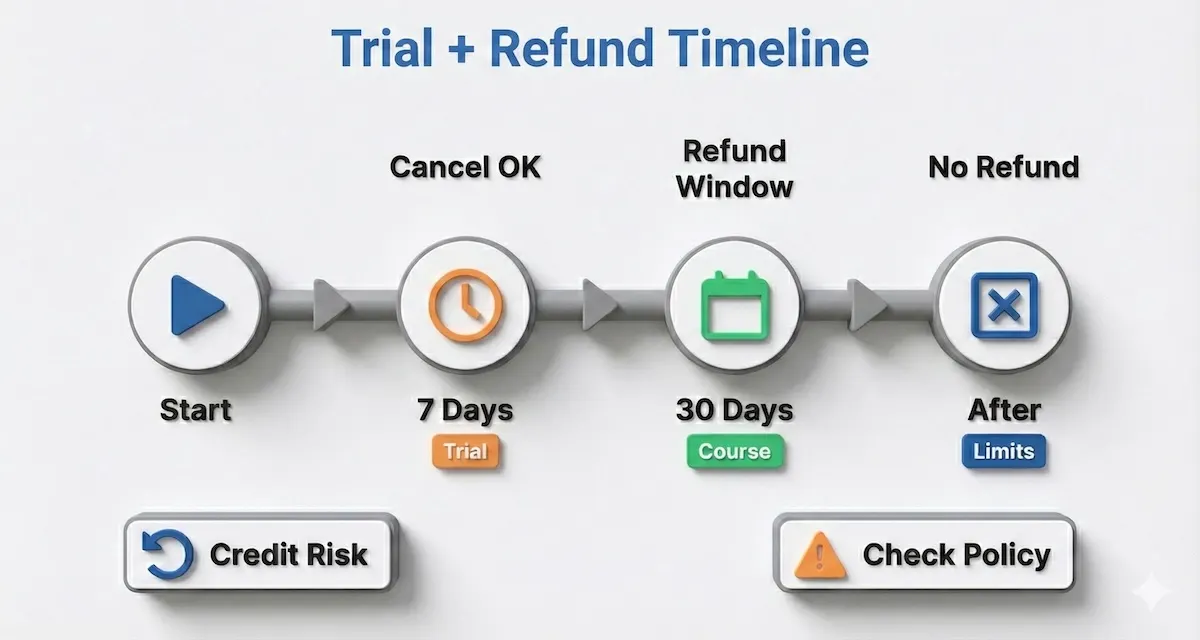
This timeline summarizes Udemy trial and refund timing so you avoid surprises before enrolling.
Always verify whether you’re buying a course or starting a subscription trial before you click pay.
Real users report mixed experiences: some students say Udemy honored refunds easily, while others claim the system pushes you toward store credit instead of a card refund. On balance, Udemy’s official policy is generous, but in practice a few users feel the process can be tricky.
Udemy Alternatives
Students and parents looking at Udemy might also consider other platforms. Some alternatives offer different formats (like live classes or university-backed courses). The list below summarizes popular options, including My Engineering Buddy. Each has its own strengths compared to Udemy.
Not every platform is built for the same outcome. Use this matrix to match your goal to the right alternative.
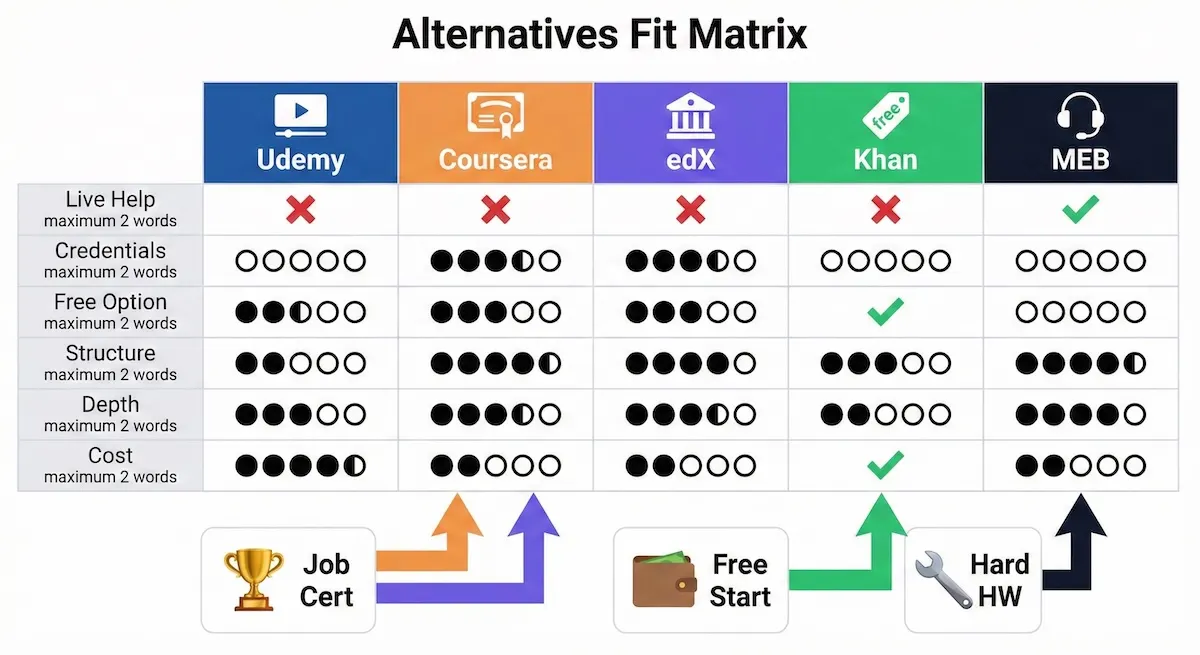
This matrix helps you choose the best Udemy alternative based on credentials, cost, structure, and live help.
If you need real-time help on a specific problem, prioritize live support over content volume.
Coursera

Coursera partners with universities and companies to provide courses, certificates, and even degrees. It has about 7,000 courses from 300+ institutions and 168 million learners. Coursera’s courses are often more academic (e.g. college-level) and may include deadlines or peer grading. Many courses are free to audit (pay only for certificates). Pros: recognized partner universities, more rigorous curriculum. Cons: fewer courses on niche topics, and certificates typically cost more than Udemy’s. Udemy offers more on-demand courses by industry experts, but Coursera’s credentials may be more widely accepted by employers.
edX
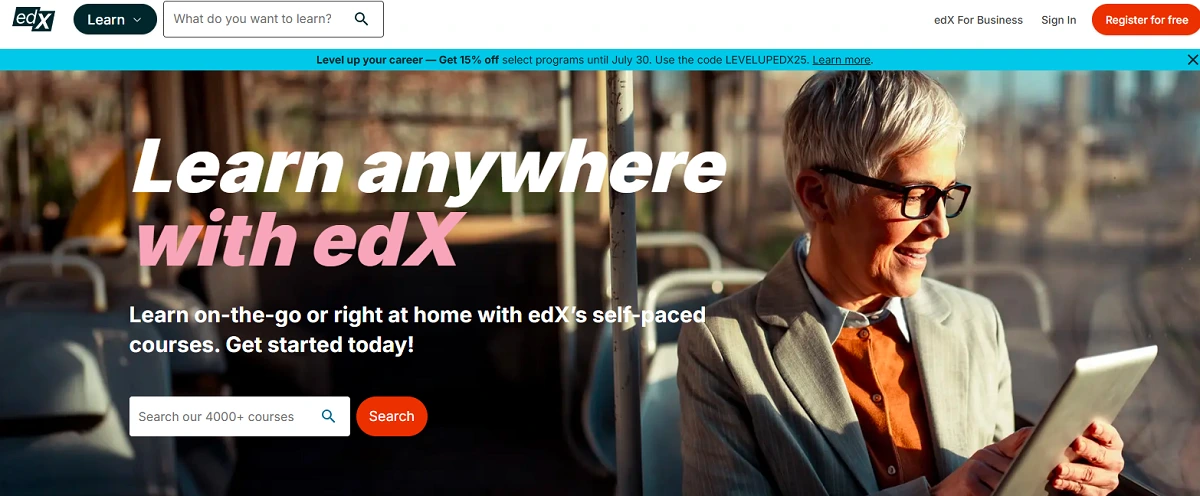
edX was founded by MIT and Harvard and focuses on academic subjects. It offers about 3,000 courses to 33 million registered students. Like Coursera, edX allows auditing courses for free and charges for verified certificates. Pros: high-quality content from top universities, credit-eligible courses (some). Cons: mainly academic; less practical tech and hobby courses. Compared to Udemy, edX courses may be more challenging and structured. Udemy has far more courses overall and is more on-demand. However, edX courses are often free to try and may carry more prestige.
Khan Academy
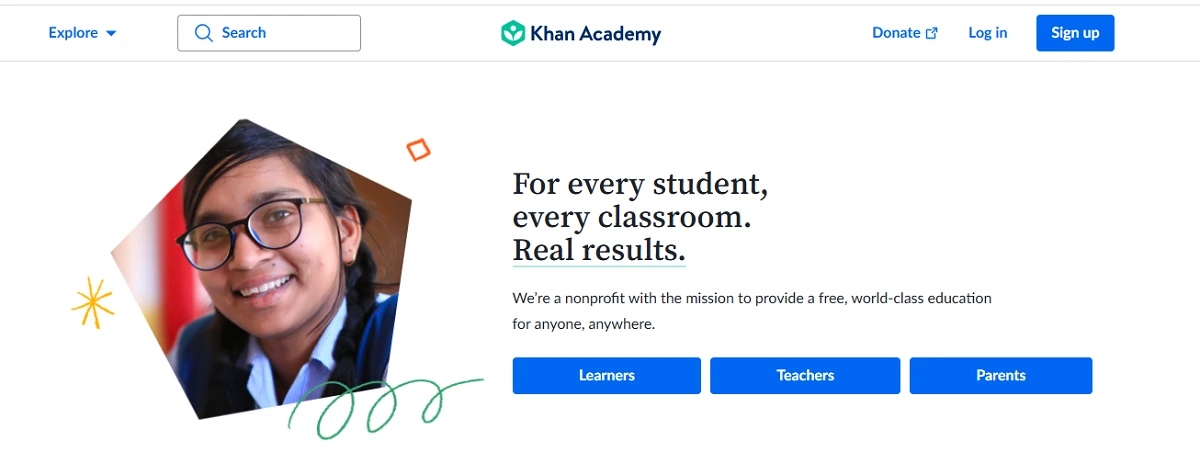
Khan Academy is a nonprofit that provides entirely free lessons on math, science, and other subjects. It has over 180 million users worldwide. Pros: completely free, high-quality instructional videos (especially for K–12 and early college). Cons: mostly covers standard curriculum and test prep, not advanced college or vocational topics. Udemy and Khan Academy do not directly overlap much; Khan Academy is free and excellent for basics. Udemy has paid courses for more advanced topics like coding bootcamps. Students on a budget might start with Khan Academy for fundamentals before paying for Udemy courses.
My Engineering Buddy
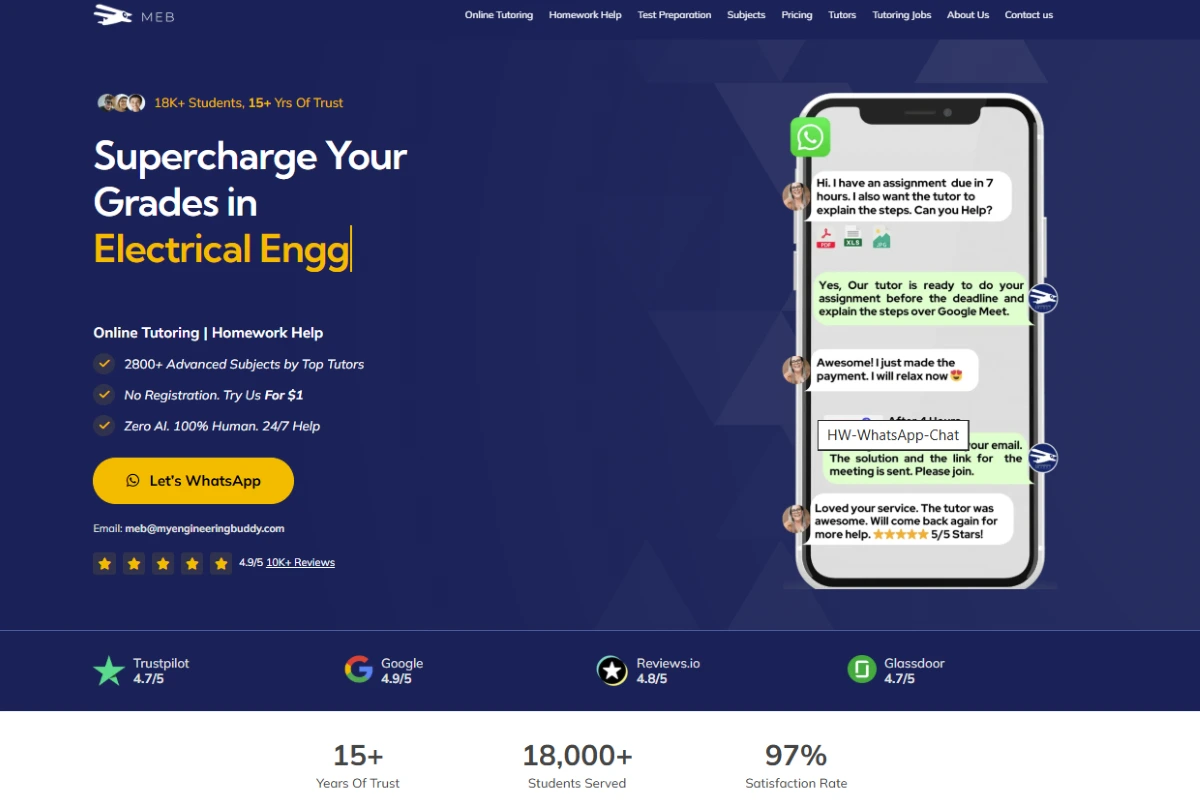
My Engineering Buddy is a live tutoring and homework-help service focusing on engineering and STEM subjects. Pros over Udemy: real-time 1:1 help, customized to your exact problem. Tutors explain homework step-by-step, which is helpful for complex subjects. MEB uses experienced tutors (often with engineering degrees). Cons: it is more expensive per session and requires scheduling. Many users say MEB’s tutors are very helpful for tough topics. Unlike Udemy’s recorded videos, MEB matches you with a tutor. For a student needing personal guidance, MEB offers a level of support that a standard course cannot provide. It covers advanced engineering, math, and science topics that Udemy may not teach in depth.
How it Works?
For Students
Students start by creating a free account on Udemy. They can then browse or search thousands of courses in fields like programming, math, business, and more. When a student finds a course they like, they enroll by paying the course fee (or using a free coupon if available). Once enrolled, they get instant access to all lectures and materials, with no deadlines. They can watch videos at their own pace, take quizzes, and ask questions in the course Q&A. Scheduling is self-directed: you learn on your own time, with progress tracking in your Udemy dashboard.
Udemy is a self-paced system. Here’s the student workflow from signup to completion.
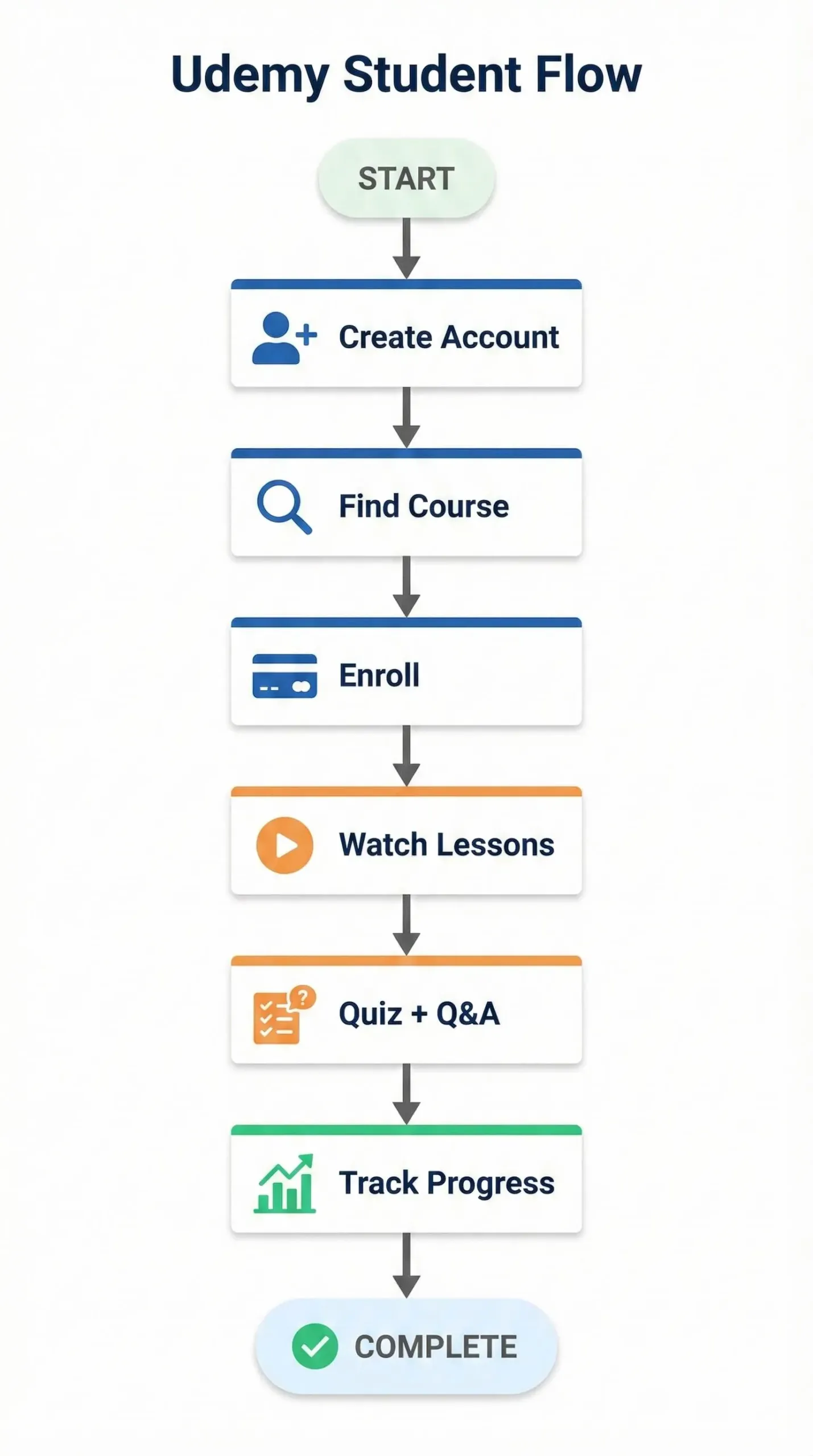
This flowchart explains how Udemy works for students, from signup to self-paced learning and progress tracking.
This is ideal if you learn best independently and want flexible scheduling.
For Tutors
Udemy’s instructors are called course creators. To become one, you sign up on Udemy’s Instructor site and follow the setup guide. You plan your course content, record video lectures, and upload them to Udemy. You also create a course landing page with descriptions and set a price. Before publishing, Udemy reviews your course for quality. Once approved, the course goes live and anyone can buy it. Instructors get paid their revenue share every month. To get started, see Udemy’s instructor sign-up page.
Can tutors set up their own fee or is it fixed by the company? Udemy instructors do set the price of each course (within Udemy’s allowed pricing tiers) and Udemy takes a commission on sales. The instructor keeps more of the sale if the buyer uses the instructor’s coupon (97% to instructor) versus Udemy’s sale price (37% to instructor).
Instructor earnings depend heavily on how the student arrives at your course. This split diagram shows the two common payout paths.
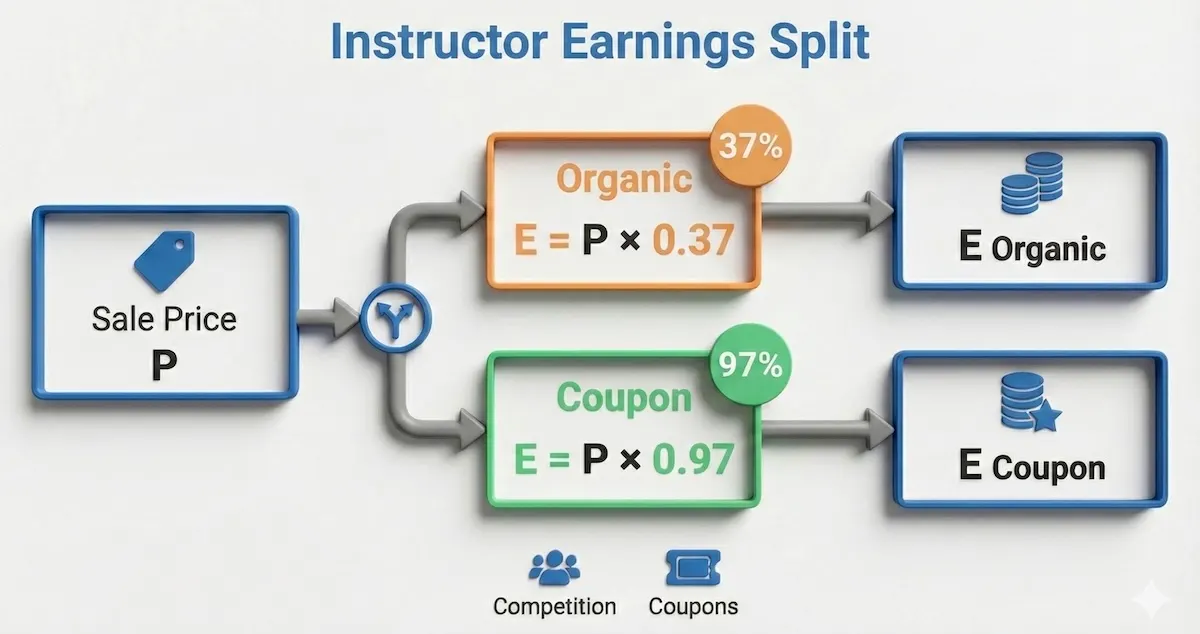
This diagram shows Udemy instructor earnings for organic sales versus coupon sales using a simple formula.
If you promote with your own coupon, your share can be dramatically higher.
How much can a tutor expect to earn? On Udemy, tutors earn based on course sales. Instructors earn roughly 37% of revenue from organic sales and up to 97% from their own promotions. Earnings vary widely: a bestselling course can earn thousands of dollars, while others may earn little. There is no set hourly wage since courses are sold to many students. In short, income depends on how well courses sell and how effectively an instructor markets them.
How many hours of work can a tutor get per month? Udemy does not guarantee any minimum number of students or teaching hours. Instructors create courses and then Udemy handles enrollment. A popular course may enroll hundreds of students per month, but a less popular one may get none. Tutors on Udemy often supplement their course sales with other income, since workload is on-demand rather than scheduled.
Is it easy to get students? It can be competitive. Udemy has many courses, so new instructors must promote their own courses. Udemy shows courses in search results based on ratings and relevance. Instructors often use coupons, social media, and Udemy’s promotional tools to attract students. Some instructors find success by niching down to a specific topic where they are expert. Overall, getting students takes marketing effort and time to build a course’s reputation.
Tips on how to get more students on Udemy: Instructors recommend using Udemy coupons to boost enrollments and launch promotions. Keep course content up to date and encourage reviews (good ratings help visibility). Sharing course links on social media, blogs, or mailing lists also helps. Writing a clear, keyword-rich course title and description improves search results. Consistency and course updates tend to attract and retain more learners.
What tutors like about Udemy: Many instructors appreciate Udemy’s large audience. You can create a course once and earn passive income as new students enroll. The platform handles payment and hosting, so instructors do not need to find students themselves. Tutors also like the flexible schedule – they can create content on their own time. Some positive reviews note the supportive instructor community and resources. (For example, Udemy’s site has blogs and guides for instructors.)
What tutors do not like about Udemy: Instructors often mention the high competition and heavy discount culture. Many say they must constantly use coupons, which drives course prices down. Some complain the platform takes a large share of revenue on organic sales. Others note the quality standards are strict, requiring time to edit and polish videos. A few reviewers say it can be hard to stand out, especially in popular fields with many existing courses.
Udemy: Company Information
Founded: Udemy was founded in May 2010. The platform began as a marketplace for expert-led courses. It was created to democratize learning by allowing anyone to teach or learn.
Founders: The company was started by three entrepreneurs: Eren Bali, Gagan Biyani, and Oktay Caglar.
Mission: Udemy’s mission is “to change lives through learning.”
Vision: Udemy says it envisions a world where “everyone, everywhere has access to the skills they need to unlock their potential.”
Headquarters: Udemy is headquartered in San Francisco, USA and operates globally.
Scale: Udemy serves tens of millions of learners worldwide. It has about 1,000 employees (as of 2024). The site is active in 190+ countries and offers courses in many languages. The majority of its users are in the US, India, and other tech-focused markets.
Services: Udemy offers on-demand video courses and a subscription service. Its main service is 1:1 video lessons on various topics. It also has Udemy for Business (corporate training plans) and a Personal Plan subscription for individuals.
Subjects: Udemy offers courses in hundreds of subjects. Major categories include Development (e.g. programming, data science), Business (marketing, management), IT & Software, Design, Personal Development, Health & Fitness, and Language.
Unique features: Key features include lifetime access to purchased courses, video learning on any device, and a Q&A forum for each course. Udemy also provides downloadable resources and certificates of completion for courses. The platform emphasizes a wide range of expert instructors and a large catalog.
Comparison with My Engineering Buddy
My Engineering Buddy (MEB) and Udemy serve different needs. MEB focuses on live one-on-one tutoring, while Udemy offers pre-recorded courses. MEB excels in personalized help for complex engineering and STEM subjects. It provides scheduled sessions with expert tutors, which can greatly help with difficult homework or projects. Udemy, by contrast, is self-study and best for general learning. MEB users often say the easy sign-up and attentive tutors were very helpful. One review notes MEB tutors turned their child’s “math dread into enjoyment” with support and humor. In summary, students should consider MEB when they need guided help and answers to specific problems. Udemy is great for affordable, flexible courses on a wide range of topics, but not for live homework help.
Customer Support and Policies
Udemy’s customer support is mostly online and automated. There is no phone support, which some users dislike. Customer inquiries are handled via help tickets. Udemy does have a clear refund policy (30 days for courses). However, Trustpilot and Reddit reviews mention frustration with getting timely help and refunds (especially for subscriptions). My Engineering Buddy, on the other hand, advertises direct contact info and personal support via tutors. MEB’s customers often get help through chat or email, and because it’s smaller, responses can be faster.
Global Reach and Localization
Udemy is truly global. It is used in over 190 countries and offers courses in many languages. The site interface supports multiple languages and regional payment methods. Udemy’s largest user bases are in the US, India, and Europe. My Engineering Buddy is also global but with a focus: it mainly serves students in the US, UK, Canada, Australia, and Gulf countries. MEB primarily operates in English, while Udemy offers courses and subtitles in various languages. Both platforms operate worldwide, but Udemy has a much larger multi-language presence.
Udemy’s future plans
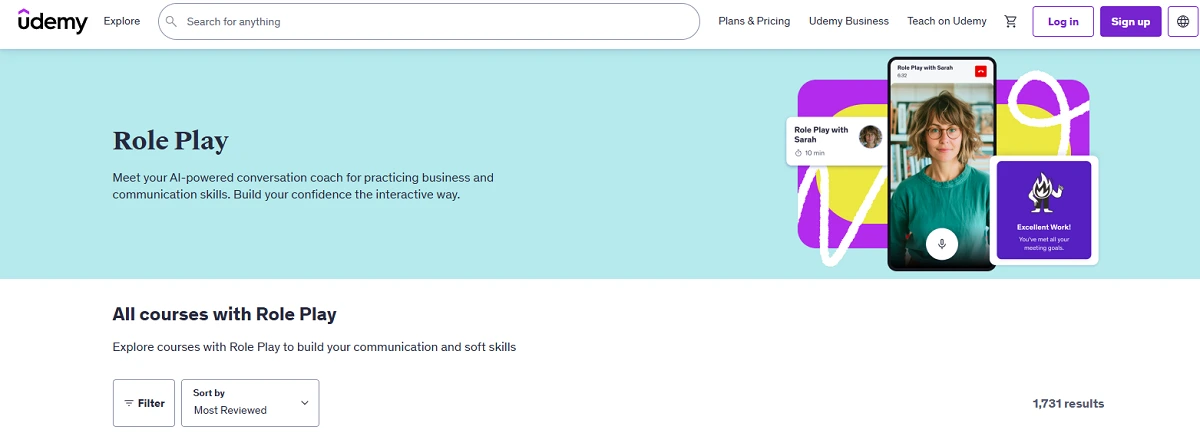
Udemy is investing heavily in AI and personalized learning. It has launched features like an AI chat assistant to recommend courses and answer student questions. Its new “Role Play” tool uses AI to help users practice soft skills in simulated conversations. Udemy also uses AI to map skills gaps and suggest career learning paths. Beyond AI, the company continues to grow its course marketplace (now over 80,000 instructors). Other future points include more industry partnerships and content updates for in-demand skills. (No specific roadmap beyond these published initiatives is available.)
FAQs About Udemy
How does Udemy compare to My Engineering Buddy? Udemy offers on-demand video courses you can watch anytime, whereas My Engineering Buddy provides live one-on-one tutoring. Udemy is broad and self-paced, good for general learning. MEB focuses on advanced engineering and math with personal attention. If you need help on a specific homework or project, MEB may be better. For flexible self-study, Udemy’s course library is unmatched.
Is Udemy accredited or does it offer degrees? Udemy is not an accredited university and does not offer official degrees. You get a certificate of completion for courses you buy, but these are not formal academic credits. The courses are mainly for skill building. (In contrast, Coursera and edX offer credentials from universities.)
Is Udemy worth it? Many students find Udemy courses valuable, especially at sale prices. You can learn new technology or skills from industry experts for a low cost. The courses are practical but not guaranteed job credentials. Reviews say it’s worth paying around $10–$20 per course during sales. However, read reviews and previews before buying, as quality varies by instructor.
Is there a free version of Udemy? No. Udemy’s platform itself is free to use, but most courses cost money. Instructors do offer some free courses. Udemy runs sales and discounts frequently, so many courses can become very cheap (or free with coupons for a short time). For completely free learning, other sites like Khan Academy may be better.
How do I sign up and use Udemy? To use Udemy, you create an account with your email. You can then browse courses and enroll by paying. Once enrolled, you instantly get access to the course videos and materials. You can watch lessons online or download videos via the Udemy app. There is no scheduling — you learn when you want and move at your own pace.
Does Udemy have a mobile app? Yes. Udemy has apps for iOS and Android. Reviews show the apps are well-rated (4.7 and 4.3 stars). You can watch courses on your phone or tablet, even offline if you download lectures. The app syncs with your account, so you can continue courses across devices.
How does Udemy make money? Udemy charges learners for courses and subscriptions. It also takes a share of each sale from instructors. Additionally, Udemy sells Udemy Business subscriptions to companies for employee training. So its revenue comes from course and subscription fees, as well as enterprise contracts.
Conclusion
Udemy’s strengths include a huge course selection, flexible learning, and low prices during sales. It is easy to access quality lectures on many topics. Weaknesses are variable course quality, aggressive discounting, and mixed customer service. My Engineering Buddy stands out as an alternative when students need live tutoring or help with hard homework. In summary, Udemy is a strong platform for broad self-paced learning, while My Engineering Buddy offers a more personal approach for advanced tutoring needs.
******************************
This article provides general educational guidance only. It is NOT official exam policy, professional academic advice, or guaranteed results. Always verify information with your school, official exam boards (College Board, Cambridge, IB), or qualified professionals before making decisions. Read Full Policies & Disclaimer , Contact Us To Report An Error
